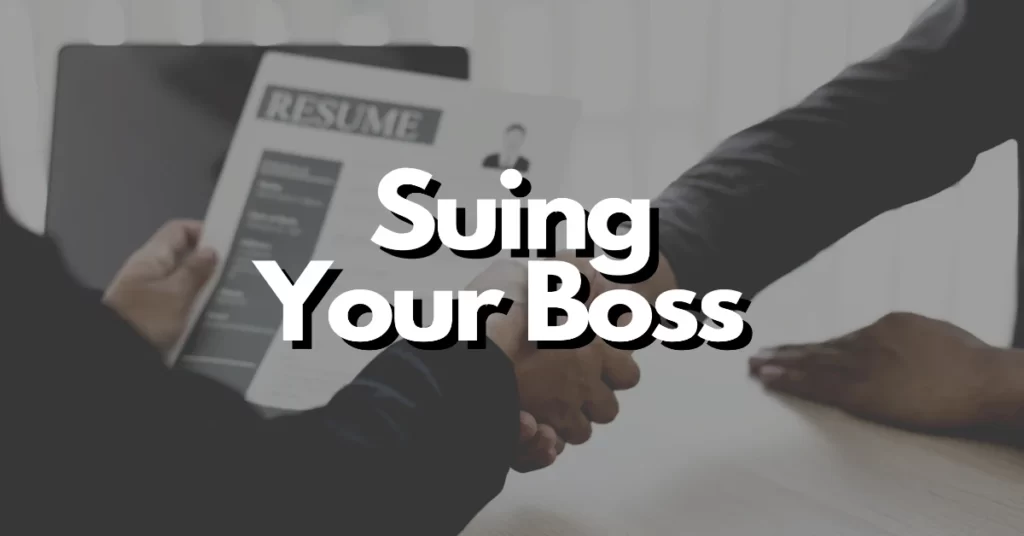As an employee, you have rights and protections under the law, and one of the questions that often arises is whether you can sue your employer. Employment-related disputes can be complex, but understanding your rights and the circumstances under which you may have legal recourse is essential.
In this guide, we’ll explore the situations in which you can sue your employer, the legal grounds for such actions, and the steps to take if you believe you have a valid employment-related lawsuit.
Understanding At-Will Employment
Before delving into the grounds for suing your employer, it’s crucial to understand the concept of at-will employment. In the United States, the default employment relationship is at-will, which means that both the employer and the employee can terminate the employment relationship at any time and for any reason, with a few exceptions.
Grounds for Suing Your Employer
While at-will employment allows for a great deal of flexibility, there are specific legal grounds on which you can sue your employer:
Discrimination: Federal and state laws prohibit workplace discrimination based on characteristics such as race, color, religion, sex, national origin, age, and disability. If you believe you were discriminated against due to one of these factors, you may have grounds for a lawsuit.
Harassment: Harassment, including sexual harassment, creates a hostile work environment and is prohibited by law. If you have been subjected to ongoing harassment by a supervisor, coworker, or anyone in your workplace, you may have a valid claim.
Retaliation: Employers are prohibited from retaliating against employees who engage in protected activities, such as reporting discrimination or workplace safety violations. If you experience adverse actions after engaging in protected activities, you may have a retaliation claim.
Wrongful Termination: While at-will employment allows employers to terminate employees for various reasons, wrongful termination occurs when the firing violates the law or an employment contract. Common examples include firing an employee for whistleblowing or refusing to participate in illegal activities.
Wage and Hour Violations: Employers must comply with wage and hour laws, which govern issues like minimum wage, overtime pay, and meal and rest breaks. If your employer has violated these laws, you may have a wage and hour claim.
Breach of Contract: If you have an employment contract that outlines the terms and conditions of your employment, your employer must adhere to its provisions. A breach of contract claim can arise if your employer fails to fulfill contractual obligations.
Workplace Safety: Employers are required to provide a safe work environment. If your employer’s actions or negligence have led to an unsafe workplace, and you’ve suffered injuries as a result, you may have a workplace safety claim.
Steps to Take When Considering Legal Action
If you believe you have grounds for suing your employer, here are essential steps to consider:
1. Document Everything: Keep detailed records of any incidents, conversations, emails, or documents related to your claim. This documentation can serve as crucial evidence in your case.
2. Consult an Attorney: Seek legal counsel from an experienced employment attorney who specializes in employment law. They can assess the strength of your case and guide you through the legal process.
3. File a Complaint: Depending on the nature of your claim, you may need to file a complaint with the appropriate government agency, such as the Equal Employment Opportunity Commission (EEOC) for discrimination claims. Your attorney can assist you with this process.
4. Negotiate or Litigate: In some cases, your attorney may attempt to negotiate a settlement with your employer. If negotiations fail, you may proceed with litigation.
5. Follow Legal Procedures: Throughout the legal process, it’s crucial to follow legal procedures, deadlines, and court requirements. Your attorney will help you navigate this complex terrain.
Conclusion
While suing your employer is a serious matter, it’s important to recognize that you have rights as an employee, and employers must adhere to labor laws and regulations. If you believe your rights have been violated or you’ve been subjected to unfair treatment in the workplace, seeking legal advice is an essential step.
Employment attorneys can provide guidance, advocate on your behalf, and help you understand the best course of action. Remember, your employment rights are there to protect you, and asserting those rights can lead to a fair resolution and justice in the workplace.

